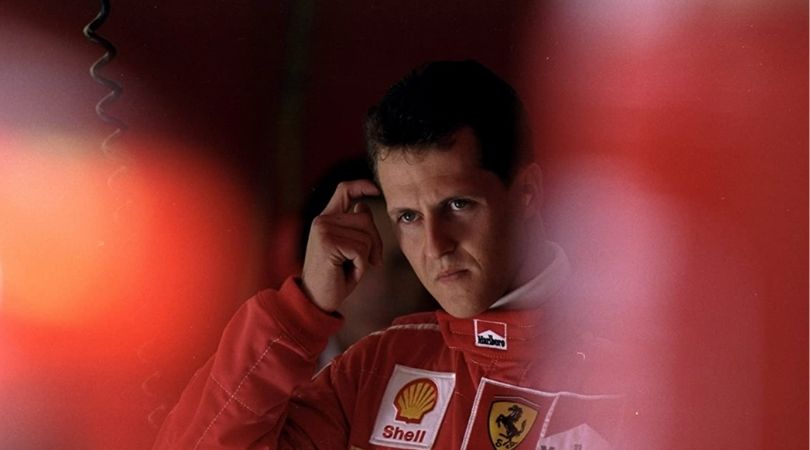
Schumacher is a German sports documentary following the life of the Formula 1 racing driver Michael Schumacher, exclusively on Netflix. Directed by Hanns-Bruno Kammertöns, Vanessa Nöcker and Michael Wech. With a record 7 World Championships, 91 wins, and over 300 races, he is considered by many to be the greatest driver of all time. A skiing accident in 2013 left Schumacher with a life-changing brain injury and a total withdrawal from public life. This is the only documentary supported by his family.
The documentary uses archive footage of races and interviews to tell the story of Schumacher’s long and star-studded career. The subjects interviewed include his rival racers such as Damon Hill and David Coulthard, iconic members of the racing community, his managers and team principals, and his immediate family. The tone of most of the interviews is one of devotion, but also of reverence. But this respect comes in many forms. For Hill, Coulthard, and the other drivers acknowledge Schumacher’s unparalleled prowess behind the wheels of a racing car—his control, his composure, his speed. But for others, it is his spirit, his determination, and his character that is brought into reflection. This gives a well-rounded judgement of his personality and his ability at the same time.
Some of the comments made by the drivers have been noted before in other interviews, but it is the deeply involved conversations with his family that are the most emotive and fascinating. His wife Corinna has a large amount of screen time in Schumacher and she is incredibly forthcoming and descriptive. The love she has for her husband radiates from every word. His children have less involvement, but the idolisation of their father is heartwarming.
The archived interviews with Michael himself are also incredibly interesting. The most somber example is a lengthy clip taken very soon after Ayrton Senna’s fatal crash. Schumacher is open and upfront about his trepidation towards getting back into the car and being very aware of the lethality of the sport. He is shaken and shocked, lacking confidence. This is the most vulnerable that this reviewer had ever seen him during his career. For such a notably private individual, such insights from both himself and his family feel sacred after his accident.
It should be noted that the plot of the documentary does not shy away from confronting Schumacher’s difficult periods whilst racing. Much of this stems from the time period the film spends the majority of its runtime on. It begins and builds during his rise to power, establishing himself at Jordan then at Bennetton. Then a huge chunk covers his early years at Ferrari. In this, the moments of imperfection are revealed—his crashes, his unsuccessful title bouts, his squabbles. Schumacher was driven, but also arrogant. This is discussed at length, and the line “overstepped the mark” is used. This is crucial within the documentary as it becomes more than just a fluff piece. These moments are pivotal to his story as it shows that his flaws also happened to be his strengths. They are hallmarks of every great sportsperson.
The shots and editing of Schumacher are excellent. Whilst all modern-day interviews are in a wide-screen format, the aspect ratio of the archive footage is small. It is not a universal size, and sometimes they can slowly enlarge. The decision by the directors not to increase the picture size is a sensible one, as it creates a sense of intimacy, which is a resounding theme throughout the film. It isn’t just video footage either, as they are numerous uses of still photos. This gives the documentary the air of a scrapbook or photo album. The editing drastically impacts the atmosphere of the film. There is race footage, including that of large crashes. But this is a documentary about a man, not a racing driver. The directors would rather include examples of Schumacher being a family man outside of his car.
Two full laps bookend the movie, existing to demonstrate the driver’s impeccable and iconic style. The music is soft and mellow. To compare with another Formula 1 documentary, Drive To Survive is an all-action, fast-paced hunt for drama, showing off all the excitement that the sport has to offer. Schumacher instead has a gentle atmosphere, like a quiet reflection instead of a companion piece.
Schumacher is a profound and touching documentary that beautifully remembers the pinnacle of Formula 1. For many fans, it may be hard to watch at times. Seeing the sportsman at the peak of his fitness, brimming with pride and confidence is lovely to see, but heartbreaking considering how tragically it changed him. This film is accessible for a newcomer to the sport or to aficionados, as all will discover something new. Although the presentation of his fight for greatness may show off moments of weakness, ultimately, the audience will come away acknowledging Schumacher’s brilliance.
The documentary doesn’t shy away from Schumacher’s accident, which is treated sensitively and with respect. The inclusion and approval of his family adds a whole different level to the film, filling it with warmth and love.
Schumacher is available now on Netflix.
Schumacher
-
Rating - 9/109/10
TL;DR
The documentary doesn’t shy away from Schumacher’s accident, which is treated sensitively and with respect. The inclusion and approval of his family adds a whole different level to the film, filling it with warmth and love.






